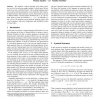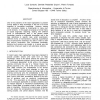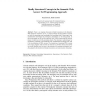258 search results - page 30 / 52 » Nonmonotonic Reasoning |
TKDE
2010
13 years 5 months ago
2010
Abstract—The imperfect nature of context in Ambient Intelligence environments and the special characteristics of the entities that possess and share the available context informa...
ECAI
2006
Springer
13 years 11 months ago
2006
Springer
Abstract. We introduce a logical language with nullary operators min(n), for each non-negative integer n, which mean `the reasoner has at least n different beliefs'. The resul...
IJCAI
1989
13 years 8 months ago
1989
One of the problems of the recent approaches to problem solving based on deep knowledge is the lack of a formal treatment of incomplete knowledge. However, dealing with incomplete...
NGC
2010
Springer
13 years 2 months ago
2010
Springer
A key to overcoming the limitations of classical artificial intelligence and to deal well with enormous amounts of information might be brain-like computing in which distributed re...
ESWS
2005
Springer
14 years 28 days ago
2005
Springer
There is an ongoing discussion whether reasoning in the Semantic Web should be monotonic or not. It seems however that the problem concerns not only the reasoning over knowledge bu...



